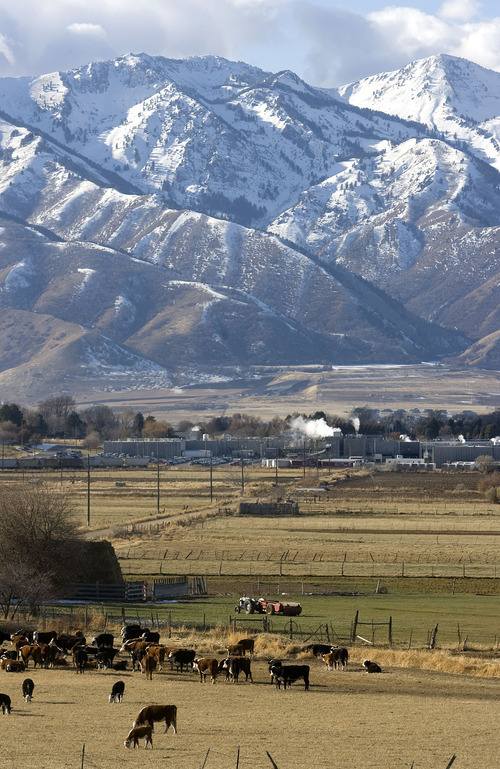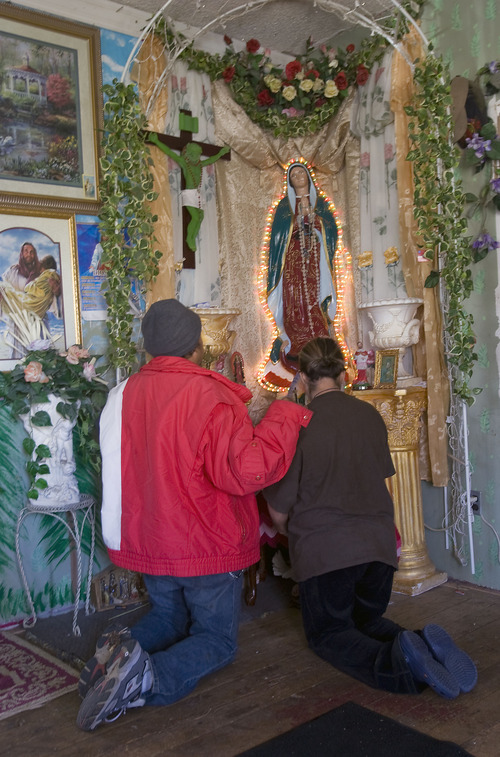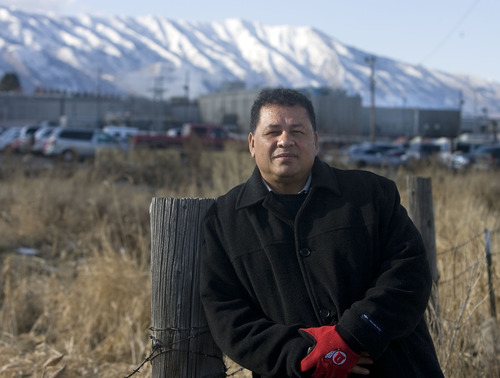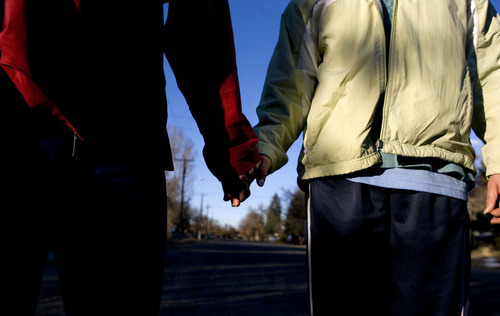This is an archived article that was published on sltrib.com in 2011, and information in the article may be outdated. It is provided only for personal research purposes and may not be reprinted.
She can't help but cry as she describes the frantic call five years ago from her husband warning that he was about to be caught up in a massive immigration raid at the Swift meat packing plant in Hyrum.
"I was shocked when he told me to put the kids in the car and get away," says "Cristina," a pseudonym to protect the identity of the Hyrum woman because she is an undocumented immigrant.
"We couldn't leave without him," says Cristina, who was then seven months pregnant with her seventh child. "I could only kneel with my children before the Virgin of Guadalupe." Coincidentally, that day — Dec. 12, 2006 — was when Catholics celebrate the virgin whom they say appeared to a peasant in Cristina's native Mexico.
She says her prayers were answered when her husband called a few hours later. "They let me go," he said. He claimed to be a U.S. citizen and showed a real Utah driver license obtained by using another person's birth certificate, bought for $800 in Idaho.
Her husband, "Rogelio," also a pseudonym, says his escape was "a miracle by the Virgin." He adds through tears, "She [the Virgin] did not want us to go, and here we are five years later."
At the raid's fifth anniversary, questions linger about how well it helped curb illegal immigration. The Immigration and Customs Enforcement (ICE) operation and its aftermath may offer lessons for Utah's hot immigration debate over tough enforcement.
While nearly 1,300 people were arrested at Swift plants nationwide that day in the largest raid ever targeting one employer — and 147 were charged in Utah — others used fake documents to evade arrest. Many who were deported would later simply return illegally.
Meanwhile, families were torn apart. Some deported parents left children behind. Some family members never saw each other again. While some would proclaim miracles, others lost their faith.
Wages at Swift would rise in attempts to attract legal residents to jobs vacated by the deported. But Swift struggled, saying it was caught between immigration laws that punish employers hiring workers here illegally and anti-discrimination laws that fine businesses for looking too deeply into Latino workers' backgrounds. The wounded U.S. company was sold a year later to a Brazilian enterprise, JSB-S.A.
Rolando Murillo is a Cache Valley Realtor and an activist for immigrant rights. He watched the effects of the raid close-up and says he sees nothing positive from it five years later.
"The only thing this accomplished was to destroy families, destroy a local company that was later sold to foreign investors and cause panic in the population," he said, estimating that about four in 10 of those deported have returned to the area.
But Ron Mortensen, a founder of the Utah Coalition on Illegal Immigration, supported the 2006 raid.
"ICE was looking for people who committed crimes by using the identities of U.S. citizens," he said. "Anyone who is committing these crimes should be submitted to the law."
Mortensen also said that according to the Social Security Administration, 75 percent of undocumented workers use a fake Social Security number, which is considered a felony.
"The raid was absolutely necessary," Mortensen said. "I understand we are talking about families, but there is an estimate of 50,000 Utah children who have had their Social Security numbers stolen by the illegal aliens.
"It is not right to provide for one family by destroying another family."
—
No miracle • "Rosa," another pseudonym, did not enjoy the luck that Rogelio and Cristina had. Her husband, mother and two sisters were arrested in the raid for working with false identities.
Rosa, also an undocumented immigrant from Central America, was the only one in the family who did not work, staying at home to watch her two children and three children of her sisters — one of them a 9-month-old baby.
"I was alone, scared and didn't know what to do. In just one day, I became the mother and father of not only my own children, but also of those of my sisters," Rosa said during an interview at her Logan home. "It's hard to remember that time," she says as tears start running down her cheeks.
"That deportation just destroyed my family," she says. "I never saw my mother again."
However, her husband and two sisters returned to Utah illegally seven months later.
"My sisters could not bear to be separated from their children. They returned and took them away. But my husband is still here, we are together," she said. "We live in the land of liberty, but with a lot of fear, especially when we see the police. We are not criminals. We only seek to work."
—
Love separated • José and Esther, also pseudonyms, met in Michoacan, Mexico. They never married but say they are each other's lifelong love and partner. In 1992, they immigrated in search of the American dream and thought that they had found it when they started working at the Swift plant.
"They paid well. I made $18 [an hour], and we could support our five children well. But everything changed when immigration raided," José says, remembering the panic that hit him when he was interrogated.
"The agents insulted and verbally abused me," José says. "I thought they would deport me with my wife, and all I could think about was my children." So he said he mustered courage and told officers that he was a U.S. citizen. But he had been working under the identity of someone else.
"They told me I was a liar, and that was not my real name. But I held firm and was able to convince them," he says. But Esther could not do the same. She was arrested, jailed and later deported to Mexico.
"My arms and feet were chained, and I spent Christmas like I was a criminal," Esther remembers. A few months later, she re-entered the country illegally to rejoin her family.
For Esther, life without her family had no meaning, so she prefers life in the shadows. "I'd rather be here in my house [than out in public] to not risk being deported," said the woman, who makes a living caring for children at her Logan home.
The deportation didn't just affect the couple. Their oldest daughter stopped believing in God because of it. "She said she asked the Virgin of Guadalupe that I would not be deported, but the Virgin didn't listen," Esther says.
An ICE spokeswoman, asked about the couple's claims of mistreatment, said the agency "holds its employees to the highest standards of professional conduct and encourages the public to report any allegations of abuse. Such allegations will be thoroughly and aggressively investigated and, if substantiated, appropriate disciplinary action will be taken."
—
Wounded company • Latino workers and their families were not the only ones thrown into turmoil by the raid.
Margaret McDonald, spokeswoman for JBS USA (subsidiary of the Brazilian parent company), which later bought Swift, said that four years before the raid, the Justice Department proposed a $2.5 million fine for Swift for running afoul of anti-discrimination laws for digging too deeply into the background of its new Latino hires. It was settled for $200,000 without an admission of guilt.
"To put it simply, we were in trouble for allegedly pushing too hard to verify" immigration status, she said. So driver licenses presented by people such as Rogelio, even though they were obtained with someone else's birth certificate, had to be accepted at face value.
"We can't ask for more than the minimum required documents, and we cannot refuse an eligible document," she said.
Meanwhile, McDonald said that since 1999 Swift voluntarily participated in the government's pilot E-Verify program to supplement its efforts to verify the identity of new hires. But she said time would show that the program had a big problem.
"The Basic Pilot/E-Verify Program could not detect duplicate records in its database. The same Social Security number could be in use at more than one employer. ... The result was a sharp increase in genuine identification documents being obtained under fraudulent circumstances, such as state identification cards obtained with valid copies of birth certificates," she said.
After the raid, Swift lost hundreds of workers either to arrests or from people who simply fled. "We were up and running the day after the raids, but we were operating at significantly lower production levels than was customary," McDonald said.
To attract replacement workers, she said wages were raised a bit, the company offered referral bonuses and "We utilized government programs that brought refugees from various places to Hyrum. These groups have been a valuable asset to their communities and to JBS."
She adds, "The raids had a significant economic effect on Swift and Co." JBS of Brazil bought it a year later for $1.4 billion. McDonald said, however, that economic damage from the raids "did not factor into JBS' decision to purchase Swift."
Bill Rupp, head of beef business for JBS, said its Hyrum plant now "is doing well business-wise. We have a stable workforce, and the plant is operating efficiently." It even has expansion plans.
Currently, the company employs about 1,100 — the same as before the raid. The starting salary for production workers is $11.50 an hour, which rises to $12.05 as a new worker completes probation, McDonald said.
Since the raid, McDonald said, "We have added a process in our employee application and interview process to 'connect the dots' of our potential employees' backgrounds, the documents they provide and the information gathered during the interview to ensure that any inconsistencies are articulated and reasonably explained."
She added, "We have also utilized significant trend analyses to help identify possible document fraud."
—
In retrospect • The raid still haunts many who were involved, and they raise doubts about how effective it really was over time.
Rogelio remembers the raid vividly. "It was horrible," he says. "Women cried, some fainted and some hid in garbage bins. ... I just asked God to help me." He did escape arrest and has continued to work in Utah since then.
Some workers fear another raid but remain anyway to try to build a better life.
Martha Escobar, an immigrant from El Salvador who works at the JBS Hyrum Beef Plant, says she personally doesn't worry because she is here legally. "I can only say that 90 percent of the workers there are Latino. This is tough work, and not many people want to work there," she says.
A couple of years after the raid Tim Counts, an ICE spokesman, told The Tribune that the agency considered the operation a "resounding success" because it removed 1,300 people who had assumed the identity of citizens, complicating their lives.
But now — five years after the raid — ICE declines to give its assessment.
"Rather than look back, we prefer to move forward, focusing on our present investigative efforts," Virginia Kice, a regional spokeswoman, responded in an email interview.
"Under the current administration, U.S. Immigration and Customs Enforcement's (ICE) emphasis in work site-related cases is on employers. The goal is to protect job opportunities for the nation's legal workers and level the playing field for employers who play by the rules," she said. "All industries, regardless of size, location and type are expected to comply with the law. But enforcement is just part of the equation — ICE is also committed to working with businesses that want to do the right thing and are interested in hiring and maintaining a legal workforce."
Lee Davidson contributed to this report. —
Legal consequences
Salt Lake City immigration attorney Mark Alvarez says undocumented workers who lie about their legal status, use false identities or return here after being deported face potentially tough penalties.
"Being in the country without documents is a civil infraction, but lying about immigration status is a federal offense," Alvarez says. "It disqualifies a person from any immigration benefit for life."
He said people caught here who previously were deported may face criminal charges and a maximum prison sentences of two years, if they have no previous criminal history.
Under Utah law, identity theft is a third-degree felony if damage is under $5,000. It carries a maximum sentence of five years. —
'Don't Let Us Forget'
Events commemorating the fifth anniversary of the Swift plant raids.
When • Monday at 7:30 p.m.
Where • Cathedral of Madeleine, 331 E. South Temple, Salt Lake City
Contact • 801-634-4271.
Also:
When • Monday at 7:30 p.m.
Where • St. Jerome Newman Center, Utah State University, 795 N. 800 East, Logan











